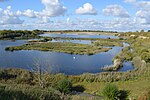Pitstone Quarry

Pitstone Quarry is a 10.3-hectare (25-acre) geological Site of Special Scientific Interest in Pitstone, Buckinghamshire. It is the area between the lake and the railway line in College Lake nature reserve. The site exposes deposits of the Middle and Late Pleistocene, during the last half-million years. Most sediments are the result of solifluction, repeated slippage during ice ages, with channels in the slopes filled with sediments. The most recent warm period, the Ipswichian around 125,000 years ago, contains hippopotamus fossils. According to Natural England evaluation continues and "the results are eagerly awaited".There is access to College Lake from Upper Icknield Way, but the most important exposure is in an area closed to the public.
Excerpt from the Wikipedia article Pitstone Quarry (License: CC BY-SA 3.0, Authors, Images).Pitstone Quarry
Upper Icknield Way, Dacorum
Geographical coordinates (GPS) Address Website Nearby Places Show on map
Geographical coordinates (GPS)
| Latitude | Longitude |
|---|---|
| N 51.820887 ° | E -0.647028 ° |
Address
College Lake Nature Reserve
Upper Icknield Way
HP23 5QG Dacorum
England, United Kingdom
Open on Google Maps







